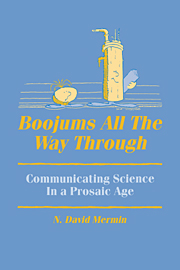Book contents
- Frontmatter
- Contents
- Preface
- I Reflections on the pursuit of physics
- 1 E pluribus boojum: The physicist as neologist
- 2 Commencement address, St. Johns College, Santa Fe, May 18, 1986
- 3 “One of the great physicists … and great characters”
- 4 My life with Landau
- 5 What's wrong with this Lagrangean?
- 6 What's wrong with this library?
- 7 What's wrong with this prose?
- 8 What's wrong with these equations?
- 9 What's wrong with these prizes?
- II The quantum theory
- III Relativity
- IV Mathematical musings
7 - What's wrong with this prose?
Published online by Cambridge University Press: 02 December 2009
- Frontmatter
- Contents
- Preface
- I Reflections on the pursuit of physics
- 1 E pluribus boojum: The physicist as neologist
- 2 Commencement address, St. Johns College, Santa Fe, May 18, 1986
- 3 “One of the great physicists … and great characters”
- 4 My life with Landau
- 5 What's wrong with this Lagrangean?
- 6 What's wrong with this library?
- 7 What's wrong with this prose?
- 8 What's wrong with these equations?
- 9 What's wrong with these prizes?
- II The quantum theory
- III Relativity
- IV Mathematical musings
Summary
I write bleary eyed and disheartened, after a long proofreading session mainly devoted to inserting into the galleys calls for the restoration of what was capriciously and destructively altered in the editorial offices of Physical Review. I proofread simply by reading the galleys, without reference to the original manuscript. My writing is a process that does not converge; I cannot read a page of my own prose without wanting to improve it. Therefore when I read proofs I entirely ignore the manuscript except to check purely technical points. Proofreading offers one more shot at elusive perfection. Proceeding in this way, I come to the end of a paragraph with a lurching sensation. The last sentence seems to be a non sequitur. Can I be failing to get my own point? Turning to the copy edited manuscript, I find a marginal message: “Author: Please note that we discourage single-sentence paragraphs.” As an application of this principle, one short emphatic paragraph has been attached to the end of another, to which it is entirely unrelated. If you set asunder what Physical Review has joined, it makes sense again.
What is the justification for such a rule? Excessive use of single-sentence paragraphs blurs the distinction between the sentence and the paragraph, makes for a visually unattractive page, and becomes boring. But the occasional single sentence paragraph is a valuable device. It gives a pause in the rush of thought, it focuses attention, and it can contribute powerfully to the rhythm of the prose.
- Type
- Chapter
- Information
- Boojums All the Way throughCommunicating Science in a Prosaic Age, pp. 63 - 67Publisher: Cambridge University PressPrint publication year: 1990

